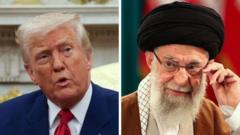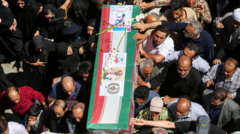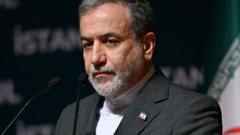**The stalled nuclear talks between Iran and the US reflect the intricate interplay of diplomacy, pressure tactics, and enduring regional conflicts.**
**Iran-US Nuclear Talks Delayed Amid Rising Tensions**

**Iran-US Nuclear Talks Delayed Amid Rising Tensions**
**Tensions rise as new sanctions and military threats complicate Iran-US nuclear discussions.**
The anticipated fourth round of nuclear negotiations between Iran and the United States has been delayed. The postponement, as confirmed by Iranian officials, is attributed to "logistical and technical reasons," with facilitators from Oman involved in the process. However, the US suggests the timing of the upcoming meeting had not been firmly established prior to this announcement.
This delay comes against the backdrop of heightened tensions following President Donald Trump's recent threats against nations engaging in oil trade with Iran. These developments emerge soon after the US imposed new sanctions targeting companies allegedly affiliated with Tehran, marking another chapter in Trump's efforts to reshape the nuclear agreement landscape, originally abandoned in 2018.
Iran's Foreign Minister, Seyed Abbas Araghchi, has reassured that Tehran remains committed to pursuing a negotiated resolution, emphasizing a need for sanctions relief and security assurances regarding its nuclear program. "Our determination to secure a negotiated solution remains unchanged," Araghchi stated on social media platform X, calling for a fair deal that respects Iran's rights.
Conversely, the US State Department mentioned that the date for the upcoming meeting has yet to be determined, expressing confidence that discussions would continue shortly. Oman's foreign minister has committed to facilitating the diplomatic process, indicating that a new meeting date would be communicated once all parties reach consensus.
Despite the postponement, analysts believe the dialogues have not collapsed, as both sides appear keen to prevent escalation into military conflict. Nevertheless, reports from Tehran reveal a growing skepticism regarding the talks' efficacy, exacerbated by the recent sanctions and perceived inconsistencies in US policy.
Trump's "maximum pressure" approach, including the latest sanctions, is designed to impede Iran's oil revenue which is critical for the regime's activities in the region. In a stark warning directed at those buying Iranian oil, Trump asserted on his Truth Social platform that violations would trigger significant penalties prohibiting subsequent business engagements with the US.
Amidst these developments, US Secretary of Defense Pete Hegseth has issued stern remarks about Iran’s actions in supporting the Houthi rebels in Yemen, aligning with a broader strategy against what the US perceives as destabilizing activities supported by Tehran. This adds another layer of complexity to the nuclear discussions, as the conflict in Yemen and Iran's affiliations with various militant groups fuel concerns.
Trump aims for a resolution preventing Iran from developing nuclear weapons while balancing pressures from hardliners within his administration who favor the dismantlement of Iran’s entire enrichment framework and an end to its regional proxy support. Iran maintains that its nuclear program is peaceful in nature and seeks benefits from negotiations that would allow restrictions on its enrichment while lifting economic sanctions.
As the heavy sanctions regime on Iran continues—second only to Russia's—President Massoud Pezeshkian has grounded Iran's economic strategies on the prospect of sanctions relief, emphasizing the critical nature of successful negotiations amid ongoing geopolitical friction.




















